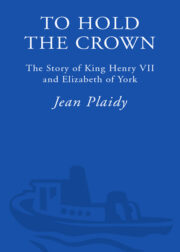Without delay he sent for Empson and Dudley, those two who because of their wizardry with figures were more in his confidence than any others.
“I had thought, naturally,” he said to them when the three of them were alone, “that Ferdinand’s power would have been increased by the death of his wife.”
“Isabella was a shrewd woman. She loved Ferdinand as a husband—strange that such a woman could have such a feeling for her family—but as a ruler she was fully aware of his deficiencies.”
Henry nodded. “And now Ferdinand has lost a great deal of that power, which was his when his wife was alive.”
“For all her devotion to her family, she was always the one who held the power. She never forgot her position and was determined that it should not be passed on to Ferdinand.”
“Well, let us look at the facts,” said Henry. “She is dead and she has appointed her daughter Juana Queen Proprietor, and Castile is settled on her and Philip her husband.”
“One can be sure that the Archduke will take every advantage of the position.”
“She does say until the majority of her grandson Charles.”
“That is some time yet. He cannot be more than four years old.”
“The Lady Katharine is not such a good match as we had first thought,” mused the King.
“No, her position has changed considerably. It is a pity that she is betrothed to the Prince.”
Henry was thoughtful. “Oh,” he said, “there are loopholes. I saw to that. I have a feeling that that marriage may not take place. I agreed to the ceremony, yes . . . because the Sovereigns were getting restive and there was the dowry to be considered, but it must necessarily be some time before a marriage could take place and a great deal can happen in that time. See how the position has changed now with the death of Isabella.”
“My lord, what is to be done?”
“I have no doubt,” said the King, “that we shall put our heads together and discover how best to settle that matter. In the meantime I have decided that the Prince of Wales shall not go to Ludlow.”
His ministers looked at him in surprise. It was customary for the Princes of Wales to reside at Ludlow. The people of Wales expected it.
“I have decided,” went on the King, “that there is much that the Prince of Wales must learn and he will do that best at my side. I want him to learn the art of kingship. I think he will learn well enough . . . in the right environment.”
The ministers nodded.
“And the commitment to the Lady Katharine?”
“Of that more later.”
The King sent for his son. Young Henry was not very pleased with his father. He had greatly looked forward to setting up his own household at Ludlow and he had been curtly informed that he was not to go there; his father believed that he could be more profitably engaged at his side. This was all very well, but at Ludlow Henry could have played at being king; at his father’s side he was always of secondary importance and the King had a way of treating him as though he were still a boy—and was not always careful of his manner toward his son in the presence of others.


"To Hold the Crown: The Story of King Henry VII and Elizabeth of York" отзывы
Отзывы читателей о книге "To Hold the Crown: The Story of King Henry VII and Elizabeth of York". Читайте комментарии и мнения людей о произведении.
Понравилась книга? Поделитесь впечатлениями - оставьте Ваш отзыв и расскажите о книге "To Hold the Crown: The Story of King Henry VII and Elizabeth of York" друзьям в соцсетях.